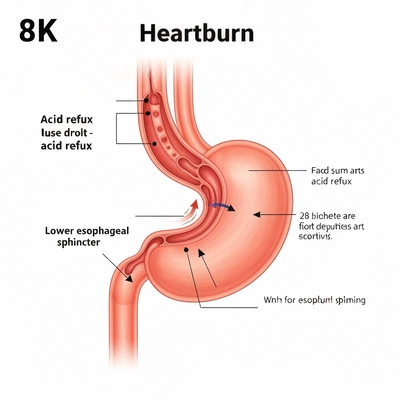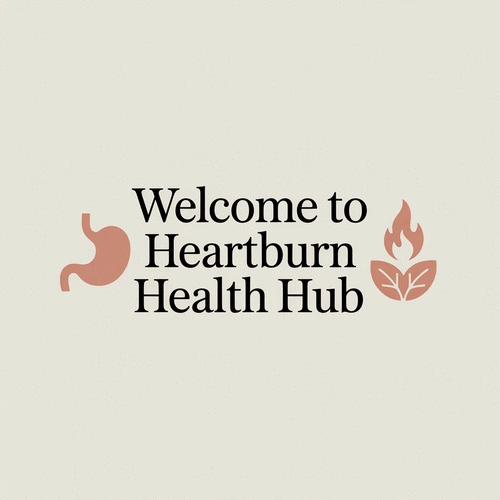What if a simple meal could lead to a gut-wrenching experience? Heartburn is more than just a nuisance; it's a signal from your body that deserves attention. Understanding its symptoms and causes can unlock the path to relief.
What You Will Learn
- Heartburn is a common symptom of acid reflux, often characterized by a burning sensation in the chest.
- Identifying personal triggers, such as certain foods and lifestyle choices, is crucial for managing heartburn effectively.
- Frequent heartburn may indicate GERD, a more serious condition that requires medical attention.
- Recognizing emergency symptoms, such as severe chest pain or difficulty breathing, is essential for timely medical intervention.
- Telemedicine offers convenient access to healthcare providers for heartburn concerns, allowing for prompt advice and treatment options.
When to Seek Medical Attention for Heartburn
Understanding the distinction between occasional heartburn and a medical emergency is crucial for your health. The visual below outlines key scenarios that should prompt a doctor's visit or an immediate trip to the emergency room.
When to See a Doctor (Self-Assessment Checklist)
- ✓ Heartburn more than twice a week?
- ✓ Interfering with daily activities?
- ✓ Over-the-counter treatments provide little relief?
- ✓ Symptoms changed or worsened recently?
If "yes" to any, schedule an appointment.
Emergency Situations (Go to ER Immediately)
- ! Severe Chest Pain: Especially if with other symptoms like arm pain or sweating.
- ! Shortness of Breath: Sudden difficulty breathing.
- ! Vomiting Blood or Severe Nausea: Any sign of blood warrants immediate care.
- ! Severe Abdominal Pain: Could indicate serious complications.
If something feels off, seek immediate medical attention.
Understanding Heartburn: Symptoms and Causes
Heartburn can be a confusing and uncomfortable experience, often leaving you questioning what exactly is happening in your body. Imagine enjoying your favorite meal, only to be interrupted by a painful burning sensation in your chest. This sensation is a common symptom of heartburn, which occurs when stomach acid flows back into the esophagus. At Heartburn Health Hub, I’m here to help you understand this condition better!
The feeling of heartburn is often described as a burning or aching sensation behind the breastbone, which can sometimes extend to the throat. It's important to recognize these feelings as they can help you identify potential triggers and manage your symptoms effectively.

What is Heartburn and How Does it Feel?
Simply put, heartburn is a symptom of acid reflux, where acid from the stomach backs up into the esophagus. Many people experience this occasionally, especially after meals or when lying down. The sensation can range from mildly uncomfortable to downright painful, and it often varies in intensity from person to person. According to the Cleveland Clinic, this backward flow of stomach acid is what causes the burning sensation.
- A burning feeling in the chest
- Sour or bitter taste in the mouth
- Difficulty swallowing
- Feeling of food being stuck in the throat
Understanding how heartburn presents itself in your body is crucial for managing it effectively. It's common to experience heartburn after consuming certain foods or drinks, so keeping a food diary can help you pinpoint your personal triggers. Remember, you’re not alone in this journey!
Common Causes of Heartburn and Acid Reflux
Various factors can lead to heartburn, and knowing them can empower you to make informed choices. Common causes include:
- Overeating or eating large meals
- Spicy, fatty, or fried foods
- Caffeine and alcohol consumption
- Smoking and obesity
Each of these factors can increase the likelihood of acid reflux, contributing to the discomfort of heartburn. By becoming aware of what might trigger your symptoms, you can take steps to reduce their frequency and severity.
Exploring Gastroesophageal Reflux Disease (GERD): A Deeper Look
While occasional heartburn is common, frequent or severe heartburn might be a sign of a more serious condition known as Gastroesophageal Reflux Disease (GERD). GERD is characterized by chronic acid reflux that occurs more than twice a week. This can lead to inflammation of the esophagus and other complications if left untreated. The American College of Gastroenterology provides comprehensive information on acid reflux and GERD.
Being aware of GERD symptoms is critical in taking control of your digestive health. If you experience:
- Persistent heartburn
- Regurgitation of food or sour liquid
- Chest pain or difficulty swallowing
it’s essential to seek medical advice from a healthcare professional. Understanding the difference between occasional heartburn and GERD can make a significant difference in your health journey!
Pro Tip
Did you know? Keeping a food diary can significantly help you identify your personal heartburn triggers. By noting what you eat and how you feel afterward, you can unveil patterns that may surprise you, allowing for better management of your symptoms!
Frequently Asked Questions About Heartburn
Emergency Situations: When to Head to the Emergency Room
Knowing when to seek help for heartburn can be challenging. At Heartburn Health Hub, I often get asked, "When is heartburn just a nuisance, and when is it a real emergency?" It's important to recognize true emergencies that require immediate care. Here’s a look at the symptoms that should prompt a quick trip to the emergency room.
Recognizing True Emergencies: Symptoms That Demand Immediate Care
Heartburn is uncomfortable, but certain signs might indicate something more serious. If you experience any of the following, it's time to consult a medical professional right away:
- Severe Chest Pain: If this pain is severe and accompanied by other symptoms like arm pain or sweating, it may be a sign of a heart attack.
- Shortness of Breath: Difficulty breathing, especially if sudden, can indicate a serious issue.
- Nausea or Vomiting: If you vomit blood or have severe nausea, seek help immediately.
- Severe Abdominal Pain: This could point to complications such as ulcers or severe gastritis.
It's crucial to trust your instincts. If something feels off, don’t hesitate to get checked out. Your health is too important to ignore!

Understanding Your Options: Telemedicine and Prompt Care
In this day and age, there are more ways to seek help than ever before! Telemedicine has become a valuable resource for those experiencing distressing symptoms. If you have concerns about your heartburn or related symptoms, consider using telehealth services. Here’s why:
- Quick access: You can connect with healthcare providers from the comfort of your home.
- Convenience: No need to travel if symptoms are making it hard to move.
- Immediate advice: Get guidance on whether to visit an ER or manage symptoms at home.
Utilizing telemedicine can bridge the gap until you can get to a healthcare provider in person. Always remember, if your condition worsens or you have severe symptoms, go directly to the nearest emergency room!
Taking Action: Your Path to Relief and Health
When it comes to managing heartburn, taking proactive steps can make a world of difference. At Heartburn Health Hub, I believe that knowledge is power!
Checklist for Self-Assessment: Should You See a Doctor?
Here’s a simple checklist to help you evaluate whether it’s time to see a doctor:
- Do you experience heartburn more than twice a week?
- Is heartburn interfering with your daily activities?
- Do over-the-counter treatments provide little or no relief?
- Have your symptoms changed or worsened recently?
If you answered "yes" to any of these questions, it might be time to schedule an appointment. Remember, it's always better to err on the side of caution when it comes to your health!
Final Thoughts: Prioritizing Your Health and Well-Being
Taking charge of your digestive health is empowering! At Heartburn Health Hub, I encourage you to listen to your body and seek medical attention when necessary. By understanding your symptoms and being proactive, you can navigate the path to relief and overall well-being. After all, your health should always be a top priority!
Recap of Key Points
Here is a quick recap of the important points discussed in the article:
- Heartburn is a burning sensation caused by stomach acid flowing back into the esophagus.
- Common triggers for heartburn include overeating, spicy foods, caffeine, alcohol, smoking, and obesity.
- Frequent heartburn may indicate GERD, which requires medical attention.
- Recognize emergency symptoms such as severe chest pain, shortness of breath, and nausea to seek immediate help.
- Utilizing telemedicine can provide quick access to healthcare advice for managing heartburn symptoms.
- Keep a food diary to identify personal triggers and modify your diet accordingly for better management.








